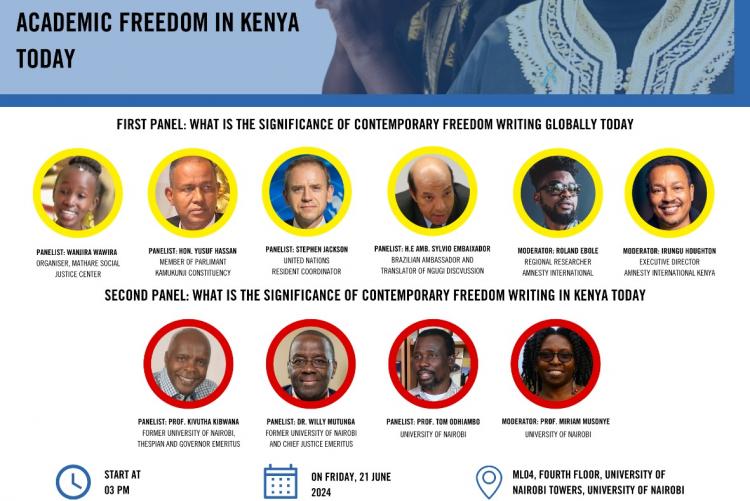A Global Voice for Freedom: Literature’s Transformational Power
The University of Nairobi department of literature, co-organised with Amnesty International Kenya and the Kenya Diaspora Alliance (USA) hosted “Celebration of Kenyans Who Wrote for Freedom: The Relevance of Kenyan Freedom Writers and Academic Freedom,” marked the end of a month-long celebration of freedom writing and academic freedom, coinciding with Madaraka Day and the recent milestones of two literary giants: Ngũgĩ wa Thiong’o’s retirement from active teaching and Micere Githae Mugo’s first anniversary since passing away.
The event served as a platform to honour the immense contributions of Ngũgĩ wa Thiong’o and Micere Mugo to Kenyan society. These two renowned writers have been instrumental in using their craft to champion human rights, ignite a passion for liberation from colonial rule, advocate for the empowerment of indigenous languages, and promote women’s rights. Their works have inspired generations of Kenyans to fight for social justice and equality.
Before the commencement of the event attendees were treated to a special pre-event tour highlighting the history of Ngũgĩ wa Thiong’o and Micere Mugo within the university’s walls which helped them gain a deeper appreciation for their contributions to the university and the wider Kenyan literary landscape.
They toured the Department of Literature, which was founded after the English Department was abolished, a move Ngũgĩ wa Thiong’o passionately championed. This department represented his desire to decolonize education and promote African languages and It’s also where Mugo served as the first female Dean at the University of Nairobi. Her leadership was characterized by a commitment to decolonizing the curriculum and promoting African literature and thought.
Panellists discussed how freedom writers unflinching portrayal of colonial injustices and their unwavering advocacy for independence through literature served as a powerful national unifier. They explored how freedom writing continues to play a crucial role in Kenya today as it empowers marginalized voices, sheds light on social inequalities, and advocates for human rights. They emphasized the importance of nurturing a culture of freedom of expression within educational institutions, where critical thinking is encouraged and aspiring writers can develop their craft.
Freedom writers are not only influential authors but also dedicated activists in the fight for rights and decolonization. Hon. Yusuf Hassan, Member of Parliament Kamukunji stated “writing isn’t the only thing a writer could do,” claiming Ngùgì actively participated in revolutions by putting up posters.
These literatures transcend borders; they are cries for freedom that resonate in every corner of the world. H.E Amb. Sylvio Josè Albuquerque and translator of Ngùgì’s work stressed that literature is transformational, revolutionary and by sharing their stories, they contribute to a broader understanding of universal struggles for freedom and equality.
While celebrating the established voices of freedom writing, emerging writers and their works were recognized and how it's contributed in shaping a more just and equitable society. They addressed how the works of these earlier writers serve as a source of inspiration and courage for contemporary Kenyan writers who dare to speak truth to power.
Freedom writing continues to play a crucial role in Kenya today as it empowers marginalized voices, sheds light on social inequalities, and advocates for human rights. The event served as a poignant reminder of the role of academic freedom in nurturing critical thinking and social responsibility. It celebrated Kenya’s rich literary heritage and its ongoing contribution to global discourse on freedom and justice.

